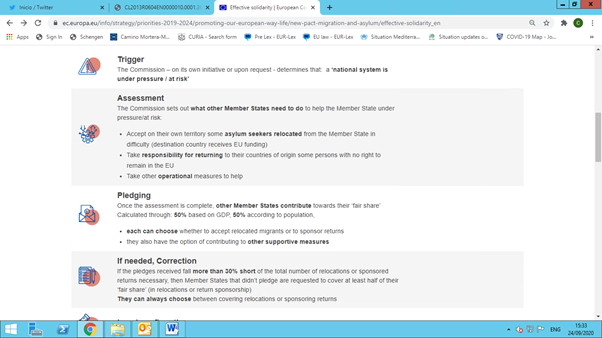I have gone through the European Commission& #39;s & #39;New Migration Pact& #39; so you don& #39;t have to. I open thread: "Nine things I like about the New Migration Pact. Two things I don& #39;t like and two things I actually do not understand" @CER_EU
Nine things I like because I believe they are both sensible and feasible (no moral judgements here)
1) Better asylum procedures with a distinction between likely/unlikely successful asylum seekers. The former will go through regular asylum procedures. The latter will go to ‘reception facilities’
2) Retouching of Dublin rules to include people with a diploma from a member-state *and* allowing the free movement of refugees after three years, not five (although I assume this should extend to family members of EU citizens too, then)
3) The idea of a Schengen Forum, bringing together member countries on a regular basis to ensure co-ordination of border management
4) The interoperability of border and migration databases (this will get me some un-following from NGO folks, but I’ve been a staunch advocate of it for a long time)
5) The three-stages crisis system. I will try to explain how it works. There are three sorts of ‘problematic’ situations: A) disembarkation after a search and rescue mission ; B) risks of pressure; C) full-blown crisis.
A) Triggers pool of pledges; if it is not enough (30 per cent shortfall), the Commission will convene a ‘Solidarity Forum’ (what is that?); if still not enough, the Commission will legally require countries to relocate or take other actions.
B) and C) trigger effective solidarity mechanism. This means that member states can choose between taking people in, returning people or contributing in kind (sending police, border forces, helping to build or run facilities).
If the Commission declares a crisis, MS can only choose between relocation or return sponsorship.
6) Immediate protection (although… how?) for people fleeing armed conflict in crisis
7) Legal migration reforms: community sponsorship; a revamped resettlement scheme; reforms to long-term residence and single permit directives (see my point on family of EU citizens above); and the EU talent pool
8) Talent partnerships with countries of origin, to bring in migrants with the necessary skills to Europe. I hope the focus is on low-medium skills and that training can also be done onsite, with help from the EU @m_clem
9) The acknowledgment that countries may need to do strange things in times of crises, but the reassurance that everything the Commission will do will be legal and enforceable.
Now for the two things I do not like, again because they are either unfeasible or unreasonable. They may only be two, but the first one is a major problem.
1) The idea of return sponsorship. This is: a) Unworkable for the most likely countries to choose it; b) A political gift for the likes of Orban, PiS and the Austrian far-right.
2) The claim that this proposal will overhaul the Dublin system. This is not unfeasible or unreasonable, it is simply not true. (See earlier thread)
And, finally, the two things I actually do not understand
1) How the effective solidarity scheme actually works. Bear with me here. This is what the Commission website says:
But the question is: if the Commission “sets out what other MS need to do”, how can the other MS then choose what to do? And what does “their fair share” (50 per cent GDP; 50 per cent population) means if they choose return or other contributions?
2) Why the need of a returns co-ordinator (how many co-ordinators can the EU possibly need?!)
This is it for today, folks. I will be recording a podcast tomorrow with one of my favourite grandes dammes of migration, @laganagan to talk *even* more about this. Stay tuned!

 Read on Twitter
Read on Twitter


